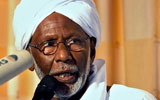
A month after Sudan’s elections—after the Sudanese government mimicked the motions of a democratic exercise, and international observers and interested states dutifully filed their critical, but ultimately box-checking reviews—the Khartoum regime seems to be tiring of the pretense of democratic transformation. All the while, the attention of the international community has already moved on.
Several arrests in the Khartoum area this past weekend suggest that the regime intends to shut down any political opposition and human rights space left in North Sudan, now that the international gaze has turned toward the South. On Saturday, government security forces arrested major opposition party leader Hassan al-Turabi as well as four staff members of a newspaper affiliated with his Popular Congress Party, or PCP. Once a close advisor to Sudanese President Omar al-Bashir, Turabi has been an outspoken critic of the government in recent years, which has landed him in prison several times. He vehemently rejected election results last month.
A security source told the African Center for Justice and Peace Studies that the newspaper was targeted because it was “misrepresenting the opinions of the people and damaging the national security of the country…they have spread sedition and abuse over Sudan’s relationship with its citizens, neighbours, and the international community.”
For awhile after ballots had been cast, it seemed that Bashir was open to inclusive dialogue, even at one point extending an invitation to opposition parties to join his government. Turabi’s arrest shows just how genuine that plan was. Budding civil society and media in the North also fear extinction. One journalist told a blogger at al-Jazeera: “The media freedom we [enjoyed] during the elections may be over tomorrow (…).”
Unlike the South, the marginalized populations in the North do not have a referendum to look forward to as a means of separating itself from the dictatorial Bashir regime. In fact, their only chance at democratic transformation and political empowerment were the elections. Unfortunately, the exercise neither ushered in a more representative and inclusive government, nor does it look to leave a legacy of one. The international community made a short-term decision to swap elections for the referendum—a strategy that has yet to prove itself—but in the long-term, the maintenance of this imbalanced political dynamic may only spell further conflict in Sudan.
Photo: Hassan al-Turabi (AP)

